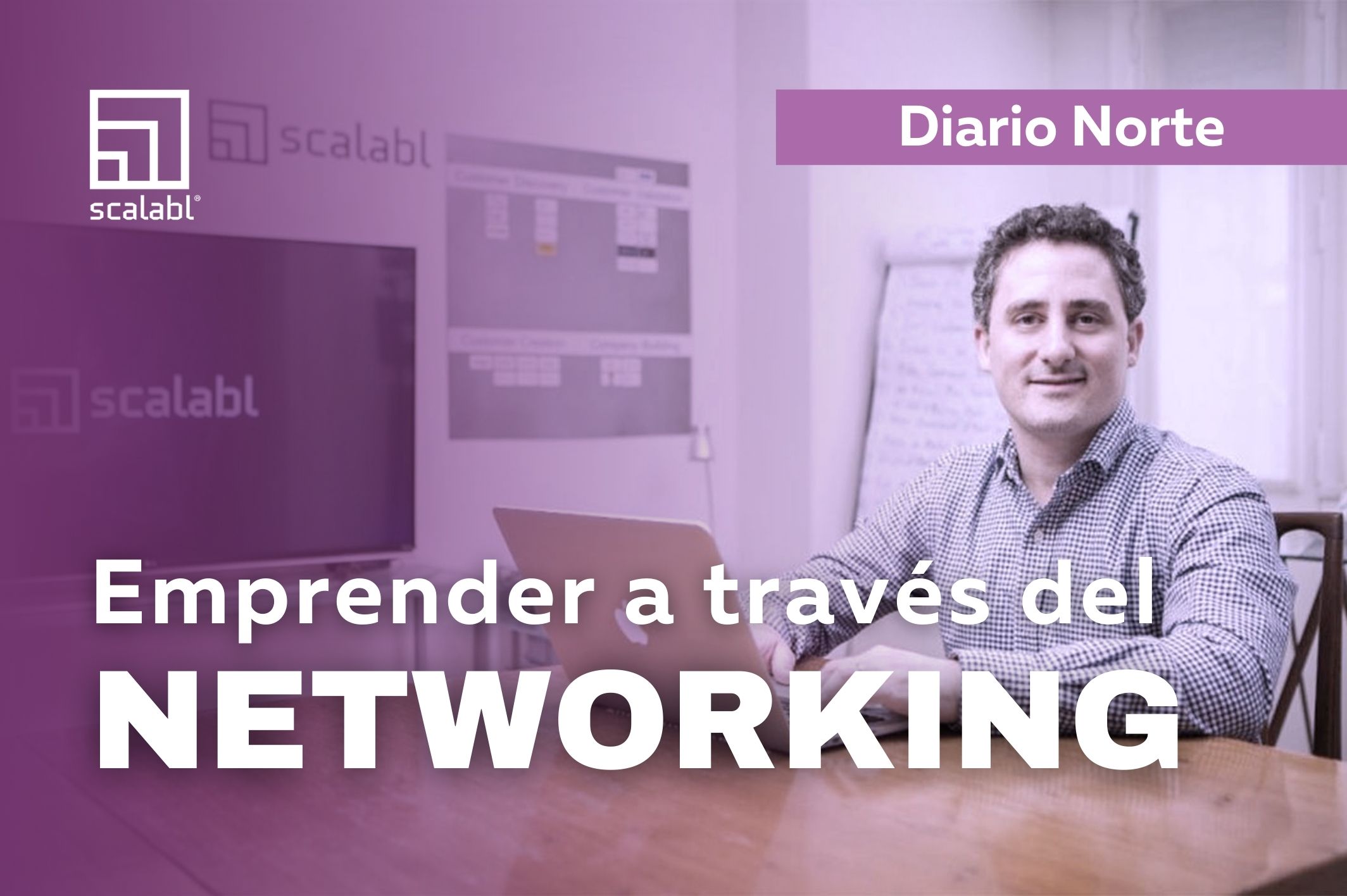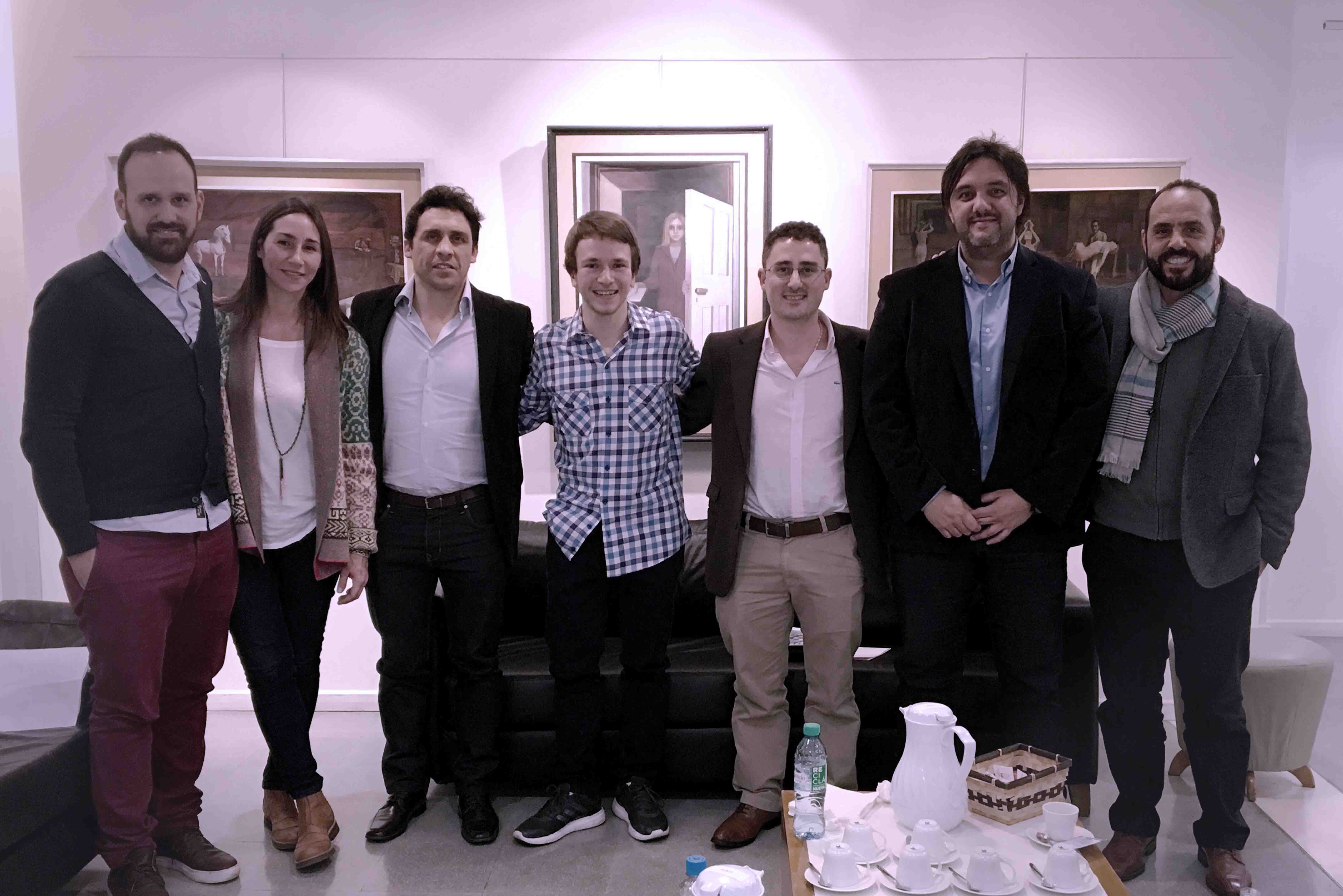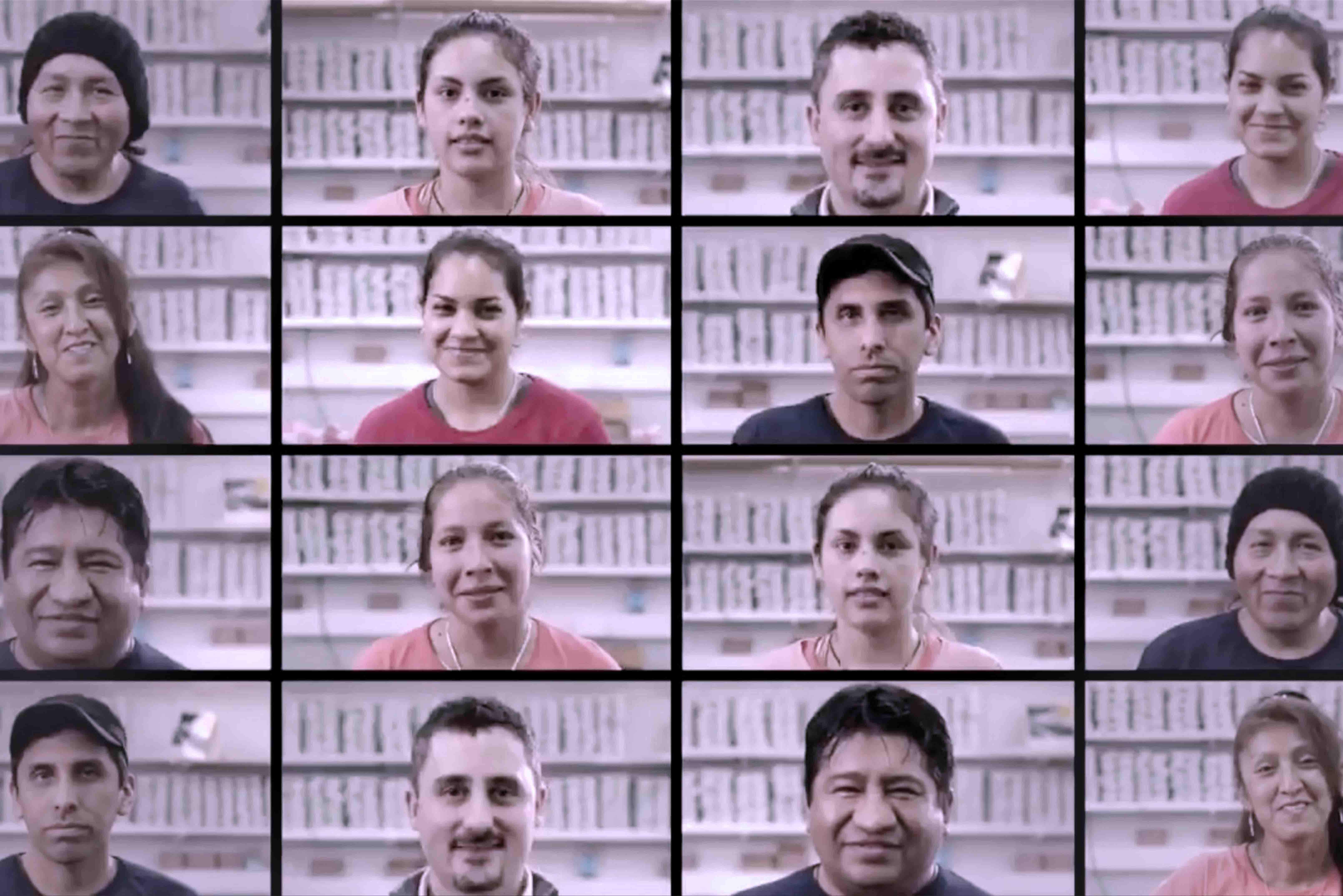

Francisco Santolo is an economist and MBA who studied at prestigious universities such as Harvard, Stanford, Chicago, Singularity, Kellogg, and MIT; in 2017, he was named the "Startup Hacker" by Forbes magazine.

By Pablo Silvestri Raffin
In addition to being a serial entrepreneur since his teenage years, he has more than ten years of experience in global corporate business. He is a consultant and an angel investor. He was co-founder and partner in more than 50 companies. He is a professor of Entrepreneurship in the MBA of CEMA University and an international speaker, invited as a Keynote Speaker at the G20 Young Entrepreneurs Alliance Summit. He was a member of the Supervisory Board at AIESEC Argentina and today is a Charter Member of TiE Hong Kong and Delhi. In 2016 he founded Scalabl, a global company specializing in Business Management and Innovation, a leader in Disruptive Entrepreneurship.
– While one might think that living in Dubai might represent the peak of your career, you decided to kick it to the curb. What led you to that?
Many years of global corporate life taught me important things about organizations, hierarchy, incentives, politics, processes, leadership, teams, and how to make things happen. I grew up, matured, and gained a better perspective on people and how the world works – what drove people's inexplicable, hurtful, and neglectful behavior every time was fear. Because fear, love, and desire, together with our vulnerability, can awaken the worst or the best in us.
The world to come will allow people to access resources that we have never seen or imagined before. And, especially, it will require us to respect and fall in love with the diversity and vulnerability of others, learn to listen and communicate, be empathic, and generate conditions for a great future instead of a terrible one.
Technology and tools that only belonged to governments and corporations are rapidly democratizing by reducing their cost. Therefore, the future will require increasingly sensitive leaders, influential within collaborative and learning communities, humble but courageous to drive transformations, and care for others.
My experience in Dubai, like all the experiences of my professional career, has been fantastic in that it was a source of great learning and personal development. Still, I believe that there is no destination in the world or hierarchical position that in and of itself guarantees that we will fulfill our potential and achieve our purpose.
Fully convinced of this coming worldview and feeling that the learning curve had flattened, I decided to stick to my belief that you shouldn't keep a job where you don't feel challenged every day. For this reason, I chose to abandon the comfort and security of my corporate position and start over with a challenge that was utterly unknown to me but that every day gave me the satisfaction of having sown something fruitful in the lives of the people with whom I shared my project. A project that would end up becoming Scalabl.
– For those who ignore the meaning of 'startup,' can it be defined in simple words?
When asked what a startup is, there are many answers, but I usually start with a quote by Steve Blank, the father of modern entrepreneurship literature. Blank writes that a startup is a "temporary organization designed to seek a repeatable and scalable business model." It's interesting to break down the concepts in this definition and to be able to assign to them the precise meanings they came to acquire for me over the years.
A startup is an "organization" insofar as one or more people coordinate and bring to the table their various talents, resources, and networks to achieve a specific goal. Whatever the purpose of each entrepreneur, the organization's purpose is always what is known in business methodology as 'Customer Development.' Instead of focusing on developing a product or a service in the way entrepreneurs often do – falling in love with their ideas – one must embark on the fantastic adventure of discovering and understanding people's problems and aspirations. How? By allowing them to describe them and express how they'd like to have them solved.
Entrepreneurs organized in this stage become facilitators searching for the best business model to provide solutions to the needs of their chosen customer segment. To do this, they must know how to find their customers, listen to and co-create with them to improve some aspects of their lives.
A startup is "temporary" because it eventually reaches a moment of maturity – although our methodology insists on continuously learning and adapting our business models based on every new piece of information that we collect. In the strict sense, when a startup has learned how to build a repeatable and scalable business model, the purpose for which it emerged is considered achieved. Then there begins a new stage in which functional areas, managing roles, and defined positions must be created within the organization for it to be able to repeat the business process over and over again.
When you are just starting, the key is not how much you progress or at what pace but to choose the right strategy and embrace continuous learning, adapting, and applying all the necessary changes. Entrepreneurship is about being clear about your purpose first so that your strategy, translated into a virtuous business model, leads you to it. In other words, you need perseverance, methodology, and resilience to win the marathon, not the race.
Entrepreneurship is about the journey and not the finish line. A startup is simply the stage in which entrepreneurs look for a repeatable and scalable business model. The secret is not to move forward alone but to surround yourself with diverse people who have good hearts and a shared vision and values.
– You are a born entrepreneur. You had the necessary vision to move forward from a very young age. What led you to create Scalabl?
I used to see things differently as a child and felt very misunderstood as a teenager. Still, somehow I managed to remain consistent with myself, exploring, learning, and experimenting with my thoughts, feelings, and points of view.
I managed to empathize strongly with others, even without fully understanding them. I grew up seeing the pains of family and friends. Somehow, I could feel what they felt. I looked into those broken hearts and was deeply moved by their potential and uniqueness while envisioning other possible scenarios for them. As this situation repeated with more and more people, I was desperate to try to help, advise or protect them while feeling responsible for the whole world. Of course, as a child, I had minimal capabilities, and the results only brought growing frustration.
Since I was a teenager, I have committed to embracing my vocation. I began to try to connect people with their potential, working on their acceptance and development, believing that I could improve things for them in this way. After so much suffering and ineffective results, two things were clear. First, I knew I needed to empower my voice and conquer a position within the acceptable status quo to be heard and become influential enough to make an impact. Second, I knew that the real and globally multiplying effect would not ensue from my efforts alone. We need more people to believe in themselves, discover that they have immense talent and a transformative power within them, to have enough confidence to start the journey of exploring and using their gifts. I believe that education, self-knowledge, learning within diverse communities, entrepreneurship, and access to the world's resources are crucial to establishing those conditions of possibility.
That is why I created Scalabl and why we work so hard to build it into a space of belonging for all the people who choose to be part of it. What brings us together is the passion for undertaking and making things possible, the vocation for continuous learning, and the willingness to be creators of opportunities for each other.
At the beginning of my fourth year as a full-time global facilitator, I embrace the world as my home, beyond nationalities, religions, languages, cultures, ideologies, choosing humans above all, and working with and influencing more leaders to make this happen.
– How can the Scalabl Global Community be defined?
I have a passion for people – to be involved in situations that allow me to delve into the heart of human motivations, into the reasoning that builds our judgments and the instincts that drive our behavior, is a source of great learning. I am fascinated by the dynamic equilibrium between our desires, fears, vulnerability, and incentive schemes, which so often leads to behaviors rooted in our most primary attack or defense mechanisms.
The raw material of my work is human life and our decisions. I'm constantly exploring possible paths for the search for meaning and purpose and developing tools to achieve real-world goals, with the deep conviction that we can accomplish them without the need to incur negligent damage.
I work tirelessly because I dream of building a network that takes care of us, that brings out the best in us, driven by the right incentives, and within which each person takes ownership and responsibility, at once contributing to and benefiting from it. In this network, each member generates initiatives, feels free and happy to add value, and becomes a creator of opportunities for others. Everyone can share their talents, and the means to achieving what they want are a conversation away, hidden in diversity, in the unknown that is the other. That is an excellent way to define the Scalabl Global Community of graduates. It's been four years since I started pursuing this purpose. I endured deep blows and frustrations along this path, which provided great learning. Like everyone else, I, too, am hurt, broken. We don't have enough resources to be vulnerable and express what we truly want and what hurts us. But every failure brings about learning, wisdom, understanding, and the ability not to take the negative behavior of others personally, as if it was directed against you. Acknowledging this allows you to return to moments of fullness, reconnect with the force of purpose, face all obstacles, and keep looking for better ways to relate with others. What happens to one person happens to the rest, and building a community requires generating incentives to reduce the probability of misunderstandings, opening up a space for more kind and enlightened behaviors.
The power of the individual is growing and will continue to grow. The power of human connection and coordination through communities with a shared purpose, passions, and interests will energize the VUCA future – volatile, uncertain, complex, and ambiguous –which is already upon us.
A decentralized community grows based on its own learning experience since it is a collaborative learning network underpinned by the following principle: do not harm the other. People relate by listening to each other, and our methodology becomes a common language. Then, the endless opportunities that open up through the interaction of more than 1,000 diverse people worldwide are self-managed and profit from the many resources and tools we teach in our courses.
Networking is the willingness to explore who the other is, what they do and what they want. It implies listening without wanting to give an opinion, listening without seeking to react, and above all, without seeking to be right or pass judgment. It also involves listening to what others tell us, lowering all defense barriers. In the end, words do not imprison us; we are free to interpret and choose.
And to capitalize on the understanding that listening provides, we train ourselves in the agility and wonder of seeing and feeling from the other's place and quickly identifying, in each situation that brings us together, what is easy for us to give and that can provide value to others. Sometimes, we do this just because of the enormous pleasure of giving first. But this is the cornerstone, together with continuous learning, on which the virtuous projects that will lead us to achieve our purpose are built.
– From the foundation of Scalabl until today, how many entrepreneurs have taken part in your training programs? And of what nationalities?
During our first four years, more than 1,000 professionals, entrepreneurs, business people, and investors worldwide have taken our courses, in person or online. They have graduated to become members of our global community. We now have alumni from Argentina, Germany, Saudi Arabia, Brazil, Canada, Colombia, Chile, Hong Kong, India, Italy, Japan, Kuwait, Malaysia, Morocco, Mexico, Macau, Peru, Paraguay, Romania, South Africa, Switzerland, Singapore, United Arab Emirates, Spain, United Kingdom, Taiwan, among other countries.
The Scalabl Global Community, which participants join upon graduating from our courses, is an increasingly diverse people network with the power to make things possible.
– To what extent do you let life surprise you?
That's a beautiful question. There are aspects in which I enjoy relaxing and seeing what life has to offer – I take pleasure in the exercise of sustaining uncertainty, in experiencing the unresolved, what is still only a possibility.
As I mentioned before, as an economist, ultimately, the raw material of my work is human life and our decisions – and everything is surprising when it comes to human lives.
Business, investment, the market, and even the games of strategy or ingenuity that I enjoy so much, require a certain stoicism to deal with the uncertain, anticipate the unexpected, and enjoy the moments of satisfaction while remaining calm in the many moments of doubt. But it is not easy to be open to surprises in everything that happens in our lives. I suppose that our vulnerability only admits a certain level of adherence to uncertainty, risk, and emotional exposure. Because vulnerability, as Brené Brown says, is from where emotions such as love, intimacy, and joy are born, and you have to be extremely brave to let yourself be affected by feelings in which you are exposed to pain and loss.
– Forbes named you the "Startup Hacker" how do you feel about that?
It describes the position I have assumed within the global startup ecosystem – it is simple but very effective in conveying the purpose of my work. A hacker is someone who discovers vulnerabilities and flaws in a system. And four years ago, I explained that the operation of the system that allegedly promotes entrepreneurs is inefficient, harms the weakest actors, and lines the pockets of a minority.
What saddens us most about the traditional startup ecosystem, led by financial intermediaries, is the vast amounts of money and human talent spent to feed the simulation that a company is growing, which is crucial to capture more rounds of investment and lead it to success. With so many real problems and so much capacity to solve them, does it make sense to create companies only so that they reach a specific valuation and can be sold for a profit before they go bankrupt? Meanwhile, financial intermediaries enrich themselves along the way, harming investors and entrepreneurs.
We are looking for people who fall in love with the problems of others and who are willing to solve them. We look for people who have the perseverance and humility to learn, who put their knowledge and talent into finding a solution that will lighten the burden of those who live with the problem. We travel the world, we know thousands of people by name, we travel across the most diverse countries, and our desire to find people with the will to respond to the world's cries for help becomes more and more evident and urgent. It doesn't matter what stirs their heart, stimulates their intellect, and activates their will.
– What does Scalabl represent in your life?
It is the means that I find today to follow my purpose of building a network of people with the ability to make things possible by combining continuous learning and relationships. We promote this ability to achieve something that positively impacts the world, on the one hand, by teaching efficient and actionable tools for generating business – or any project. On the other hand, we promote it by coordinating the wills of those who make up this network, who pull together to help each other achieve their desires. By promoting the personal fulfillment of each member's dreams and nurturing their talents, we generate a better space for coexistence.
Scalabl is for me what I want it to be for all its members: a place of belonging, a meeting space, a source of knowledge development, a reference site, a source of inspiration, an opportunity to accept and value what is different, a shortcut that allows us to reach our desires more effectively through cooperation.







